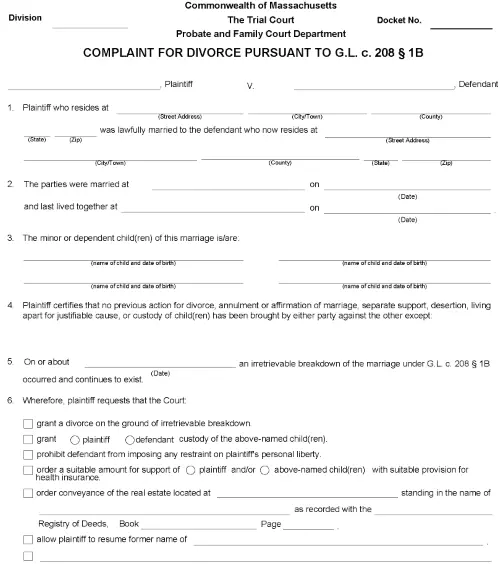To file for divorce in Massachusetts, you must have lived in the state for one year. You may also file for divorce if the reason the marriage ended occurred in Massachusetts and you have lived in Massachusetts as a couple.
Types of Divorce in Massachusetts
There are seven reasons to file for fault divorce. This means the other party was at fault in causing the marriage to fall apart. In a no-fault divorce neither party blames the other, and both agree to end the marriage. This is called Irretrievable Breakdown of the Marriage.
To further complicate the filing for divorce, Massachusetts has two types of irretrievable breakdowns, referred to as 1A and 1B. File a “1A” divorce when both spouses agree that the marriage has irretrievably broken down and they have reached a written agreement about child support, parenting time, alimony, child custody, and dividing marital assets. This is an uncontested no-fault divorce.
File a “1B” divorce when one spouse believes there is an irretrievable breakdown of the marriage or both spouses believe the marriage has ended but they aren’t in agreement about custody, support, or marital property issues. This is a contested no-fault divorce.
Example of Massachusetts Complaint For Divorce

Massachusetts Divorce Papers
Below are the available Massachusetts divorce papers. You will not need to file every form. You may need additional forms as directed by the clerk of court.
Massachusetts Report of Absolute Divorce or Annulment – Vital Statistics
Massachusetts Affidavit of Care and Custody
Massachusetts Joint Petition For Divorce Under 1A
Massachusetts Complaint For Divorce CJD 101
Massachusetts Complaint For Divorce Under 1B
Massachusetts Affidavit of Irretrievable Breakdown
Massachusetts Child Support Guidelines Worksheet
Massachusetts Financial Statement Short Form (earnings less than $75,000 per year)
Massachusetts Financial Statement Long Form (earnings more than $75,000 per year)
Mandatory Co-Parenting Course
When there is no agreement on custody and/or parenting time of their minor children, all parents must attend the four-hour online co-parenting course “Two Families Now” unless a Judge waives the requirement.
If all parents agree that the class is not necessary, you may file a Motion To Waive Attendance at Two-Families Now Co-Parenting Course with the court to forego the course.